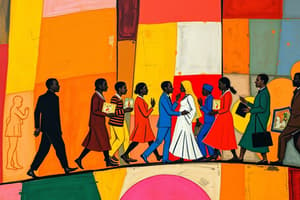Podcast
Questions and Answers
What is social stratification?
What is social stratification?
- A measurement of wealth distribution
- The ranking of people or groups according to their unequal access to scarce resources (correct)
- The social mobility of individuals
- The ranking of people or groups according to their equal access to resources
What is horizontal mobility?
What is horizontal mobility?
A change in occupation within the same social class
Who is Karl Marx?
Who is Karl Marx?
A sociologist who studied social classes and proposed that only two classes would exist: the bourgeoisie and the proletariat.
What is vertical mobility?
What is vertical mobility?
What does false consciousness refer to?
What does false consciousness refer to?
What is intergenerational mobility?
What is intergenerational mobility?
What is a caste system?
What is a caste system?
What is the functionalist view of stratification?
What is the functionalist view of stratification?
What is social class?
What is social class?
What is the conflict view of stratification?
What is the conflict view of stratification?
Who are the bourgeoisie?
Who are the bourgeoisie?
What is the symbolic interactionist view on stratification?
What is the symbolic interactionist view on stratification?
Who are the proletariat?
Who are the proletariat?
What is relative poverty?
What is relative poverty?
What is wealth?
What is wealth?
What is absolute poverty?
What is absolute poverty?
What is power?
What is power?
What is prestige?
What is prestige?
What is mobility?
What is mobility?
What is welfare?
What is welfare?
What is the class system in America?
What is the class system in America?
What is social security?
What is social security?
Who makes up the upper class?
Who makes up the upper class?
What does AFDC stand for?
What does AFDC stand for?
What does TANF stand for?
What does TANF stand for?
Who makes up the upper middle class?
Who makes up the upper middle class?
Who is Lyndon Johnson?
Who is Lyndon Johnson?
Who makes up the middle class?
Who makes up the middle class?
Flashcards are hidden until you start studying
Study Notes
Social Stratification
- Refers to the hierarchical ranking of individuals or groups based on unequal access to resources.
- Includes factors like wealth, power, prestige, and social status.
Types of Mobility
- Horizontal Mobility: Change in job or occupation within the same social class.
- Vertical Mobility: Movement up or down the social hierarchy.
- Intergenerational Mobility: Status or class change that occurs between different generations.
Theoretical Perspectives
- Functionalist View: Argues that stratification is based on job importance and required qualifications; higher compensation for more critical roles.
- Conflict View: Suggests inequality arises from exploitation and the maintenance of false consciousness among the less powerful.
- Symbolic Interactionist View: Focuses on socialization processes that reinforce existing stratification and the relationship between class and self-esteem.
Key Sociologists
- Karl Marx: Analyzed social classes and posited that only the bourgeoisie (owners) and proletariat (workers) would exist; believed economic factors drove societal structures.
Class Systems
- Caste System: Rigid structure preventing social mobility; historically seen in India.
- Class System in America: An open system allowing individuals to move between classes, with no permanent class confinement.
- Upper Class: Comprises 1% of the population, often old wealth societies.
- Upper Middle Class: Represents 14% of the society, includes successful professionals.
- Middle Class: About 30% of the population, includes small business owners and professionals.
Poverty Concepts
- Absolute Poverty: Inability to afford basic life necessities.
- Relative Poverty: Economic disparity between the poorest and the broader society, indicating social inequality.
Social Security and Welfare
- Social Security: Provides benefits to retired, disabled, or unemployed individuals.
- Welfare Programs: Designed to assist those in need; includes:
- AFDC: Aid for families with dependent children.
- TANF: Temporary assistance for needy families, with time-limited support contingent on work.
Additional Key Terms
- Wealth: Total economic resources held by individuals or groups.
- Power: The capacity to influence others, often against their will.
- Prestige: Social respect and admiration associated with particular social positions.
- Mobility: Movement between different social classes, indicating social fluidity.
- False Consciousness: The acceptance of the dominant class's values by the oppressed class, hindering class awareness.
Notable Figures
- Lyndon Johnson: Initiated the "war on poverty" aimed at eradicating poverty in the U.S.
Studying That Suits You
Use AI to generate personalized quizzes and flashcards to suit your learning preferences.




